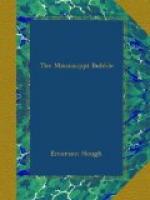Mary Connynge was silent for a moment. It was necessary that, at least for a moment, the poison of some aeons should distil. There was need of savagery to say what she proposed to say. The voice of training, of civilization, of unselfishness, of friendship raised a protest. Wait then for a moment. Wait until the bitterness of an ambitious and unrounded life could formulate this evil impulse. Wait, till Mary Connynge could summon treachery enough to slay her friend. And yet, wait only until the primitive soul of Mary Connynge should become altogether imperative in its demands! For after all, was not this friend a woman, and is not the earth builded as it is? And hath not God made male and female its inhabitants; and as there is war of male and male, is there not war of female and female, until the end of time?
“I came from the Lady Catharine,” said Mary Connynge, slowly, “but I bring no message from her of the sort which perhaps you wished.” It was a desperate, reckless lie, a lie almost certain of detection yet it was the only resource of the moment, and a moment later it was too late to recall. One lie must now follow another, and all must make a deadly coil.
“Madam, I am sorry,” said John Law, quietly, yet his face twitched sharply at the impact of these cutting words. “Did you know of my letter to her?”
“Am I not here?” said Mary Connynge.
“True, and I thank you deeply. But how, why-pray you, understand that I would be set right. I would not undergo more than is necessary. Will you not explain?”
“There is but little to explain—little, though it may mean much. It must be private. Your brother—he must never know. Promise me not to speak to him of this.”
“This means much to me, I doubt not, my dear lady,” said John Law. “I trust I may keep my counsel in a matter which comes so close to me.”
“Yes, truly,” replied Mary Connynge, “if you had set your heart upon a kindly answer.”
“What! You mean, then, that she—”
“Do you promise?”
The brows of Law settled deeper and deeper into the frown which marked him when he was perturbed. The blood, settled back, now slowly mounted again into his face, the resentful, fighting blood of the Highlander.
“I promise,” he cried. “And now, tell me what answer had the Lady Catharine Knollys.”
“She declined to answer,” said Mary Connynge, slowly and evenly. “Declined to come. She said that she was ill enough pleased to hear of your brawling. Said that she doubted not the law would punish you, nor doubted that the law was just.”
John Law half whirled upon his heel, smote his hands together and laughed loud and bitterly.
“Madam,” said he, “I had never thought to say it to a woman, but in very justice I must tell you that I see quite through this shallow falsehood.”
“Sir,” said Mary Connynge, her hands clutching at the arms of her chair, “this is unusual speech to a lady!”




